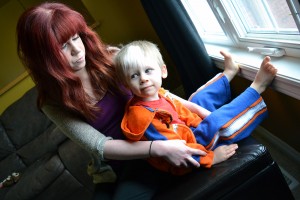Measles outbreak in North America

Melissa Hansen and her son Preston, 3, at their house in Windsor on Feb. 9, 2015. Hansen is an advocate for child vaccinations. (Photo by Allanah Wills)
By Allanah Wills
An illness that once killed many of its victims and was thought to be wiped-out in North America has returned.
The measles virus has seen an outbreak in the past few months across North America. According to Ontario’s Health Ministry there have been 17 lab-confirmed cases of measles this year in Ontario as of Feb. 19, compared to 22 cases reported for all of 2014.
“Measles is a disease that is caused by the measles virus, a member of the morbillivirus,” said Vanessa Petrilli, a registered nurse at London’s Victoria Hospital. “It is infectious, very contagious and has no cure.”
The viral disease is spread mainly through the respiratory tract and causes fever, rash, cough, runny nose and poses the threat of a serious illness-encephalitis; which is an inflammation of the brain.
“Measles can lead to serious complications from ear infection and pneumonia to blindness,” said Petrilli. “In one in every 1,000 cases encephalitis can occur, which may lead to permanent brain damage.”
Once a common childhood illness, measles decreased as widespread vaccinations became more available. According to the World Health Organization, prior to 1980, measles caused around 2.6 million deaths globally each year. In 2013, it was responsible for 145,700 global deaths.
The current outbreak gained widespread attention in January when its beginnings were linked to Disneyland California, infecting 102 people across 14 states.
Courtney Nelson, an RN at the medical unit at Windsor Regional Hospital, thinks the outbreak is due to a mix of lack of vaccinations and how contagious the illness is.
“One of the main reasons the measles virus has returned to North America is due to the fact that parents are not vaccinating their children,” said Nelson. “Those who are not vaccinated can contract the virus from children who have been vaccinated, making the virus prevalent again.”
Since the outbreak began, the issue of vaccinations has been a topic of much debate. Although there is an estimated 84 per cent global immunization coverage, there is still a large group of people opposed to vaccines.
“There’s lots of stigma behind it (the vaccine),” said Nelson. “With the media, everything gets out easier. If one child has a bad reaction it goes all over social media, and people worry.”
This worry has been around for more than 25 years. Dr. Andrew Wakefield published an article in 1988 in the medical journal, The Lancet, suggesting the measles, mumps and rubella vaccine was linked to autism.
“Scientists do not know what causes autism exactly, this is a fact,” said Petrilli.
Despite The Lancet eventually retracting Wakefield’s publication, the study launched the latest “anti-vaccination movement.” A Google search of this term will provide dozens of websites where parents are discouraged from getting their children vaccinated.
VacTruth.com allows parents to sign up for a report that shows all the ingredients in the vaccines that children will receive by the time they are six years old, and claims parents are often pressured into getting their children vaccinated.
Melissa Hansen is a Windsor mother who made sure her three-year-old son was vaccinated.
“I am scared of the measles,” Hansen said. “That’s why I got my child vaccinated. Measles are so contagious and I know there’s all this talk about autism, but there’s risks to everything. If parents don’t want to vaccinate, then that’s their choice and they should keep their kids at home.”
Vaccinated or not, health care officials are asking all parents to be vigilant about the symptoms of measles and if it is suspected a family member has been exposed to the virus, call a health care provider immediately.


